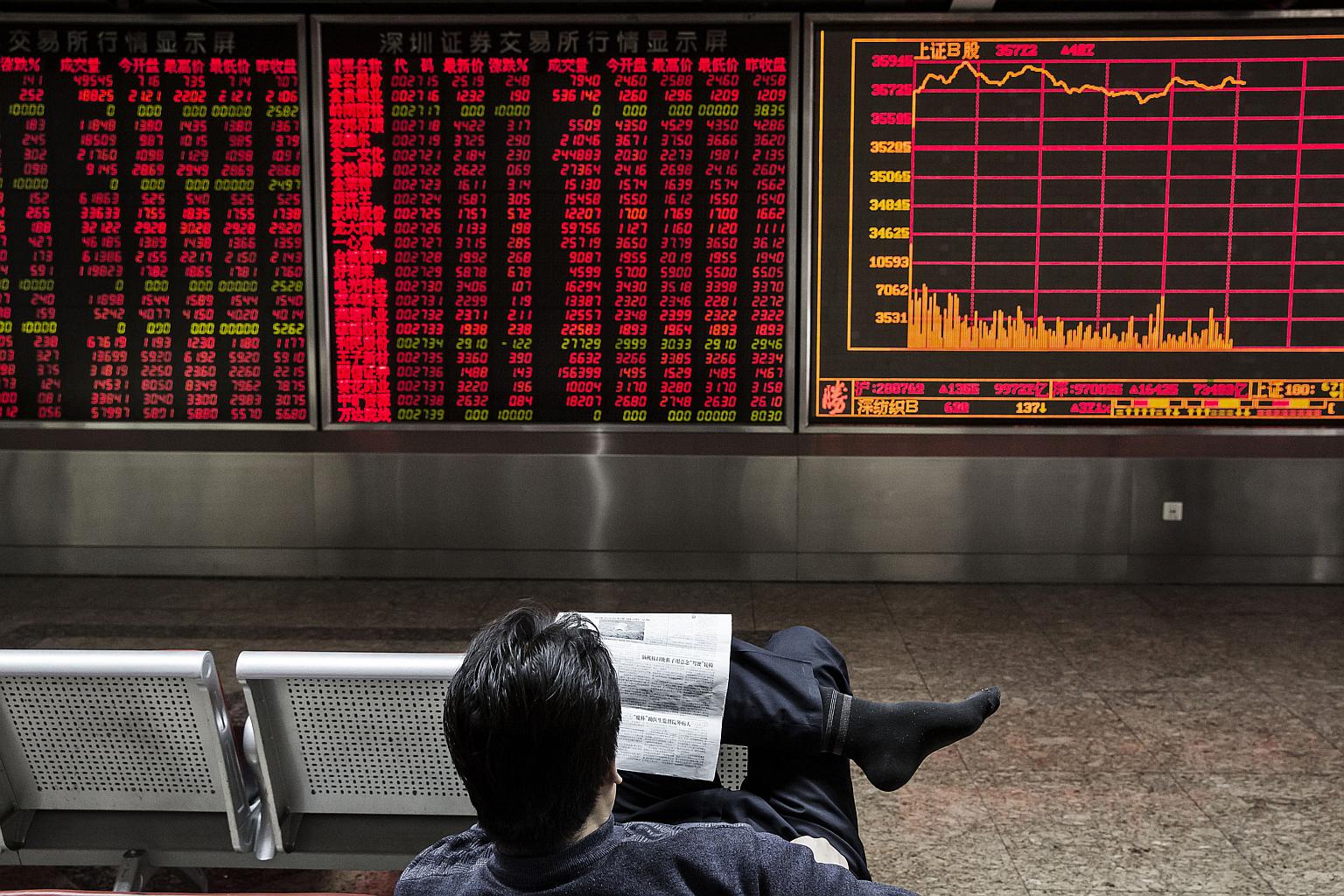Asian stock retreat deepens as China sparks global growth fears, STI up 0.5%
Sign up now: Get ST's newsletters delivered to your inbox

A man reading a newspaper in front of an electronic board displaying share prices at a securities brokerage in Beijing, China, on March 7, 2016.
PHOTO: BLOOMBERG
Follow topic:
WELLINGTON/TPKYO (Bloomberg) - Asian stocks fell the most in three weeks and emerging-market currencies weakened on Wednesday (March 9) as renewed concern over the state of the global economy curbed demand for riskier assets.
A three-week rally that restored almost US$5 trillion to the value of equities worldwide halted this week as data showed slides in Japan's gross domestic product and China's exports.
The MSCI Asia Pacific Index lost 1.1 per cent as of 11:54 am Tokyo time, set for its lowest close in a week as measures of materials and energy stocks sank more than 2 per cent. Japan's Topix dropped for a third day, led by shipping stocks after Mitsubishi UFJ Morgan Stanley lowered price targets for the sector's three biggest companies. The Shanghai Composite Index lost 2.4 per cent, sliding for the first time in seven days.
Singapore's Straits Times Index bucked the regional retreat, trading up 0.51 per cent at 2,792.90 as of 1:42 pm.
"Yesterday's China trade data has become the seismic center for concerns over the global economy," said Chihiro Ohta, general manager of investment information at SMBC Nikko Securities Inc. in Tokyo. "The recent trend is that when the market's up everything goes up, and when it's down everything is down. It's not a nimble market where certain areas rise and certain areas fall."
The International Monetary Fund said on Tuesday that volatile financial markets and low commodity prices are heightening risks for the global economy, while DoubleLine Capital's Jeffrey Gundlach said betting on stocks is a "big losing proposition."
The European Central Bank is widely expected to deliver a package of easing measures on Thursday, before monetary authorities in the US and Japan meet next week.
"As much as I would like to agree with the positive sentiment, several key macro headwinds remain on point and the drivers of the past week are now showing signs of topping out," Evan Lucas, a markets strategist in Melbourne at IG Ltd., said in an e-mail to clients. "Markets will remain volatile and trade in a direction-less manner."
Standard & Poor's 500 Index futures were little changed, after the benchmark snapped a five-day winning streak. The gauge has about 2 per cent upside and 20 per cent downside, making for a lousy risk-reward trade-off, according to money manager Gundlach, who runs the US$56 billion DoubleLine Total Return Bond Fund. The recent rebound was a "bear market rally," he said.
The yen traded at 112.62 per US dollar, after strengthening as much as 0.2 percent to 112.41, and gained 0.3 per cent against the euro. The currency, which typically moves in the opposite direction to Japanese stocks, is the best performer among major peers this year.
"Risk sentiment has been one factor behind yen buying," said Masato Yanagiya, head of foreign-exchange and money trading at Sumitomo Mitsui Banking Corp. in New York. "The dollar is also facing a broad reversal trend from last year when it was bought on expectations for monetary policy tightening. Such positions are quite huge so dollar selling may continue for a while."
Most emerging-market currencies weakened against the greenback, led by a 0.7 per cent drop in the won. South Korea's central bank will review monetary policy tomorrow and seven out of 18 economists surveyed by Bloomberg forecast the benchmark interest rate will be cut from a record-low 1.5 per cent. Malaysia's ringgit declined 0.5 per cent before a Wednesday policy review.
Crude oil was little changed at US$36.48 a barrel in New York, after a 3.7 per cent slide overnight on Tuesday that marked its biggest loss in almost four weeks. US inventories climbed by 4.4 million barrels last week, the industry-funded American Petroleum Institute was said to report. Government data on Wednesday is forecast to also show supplies increased, keeping stockpiles at the highest level in more than eight decades.

